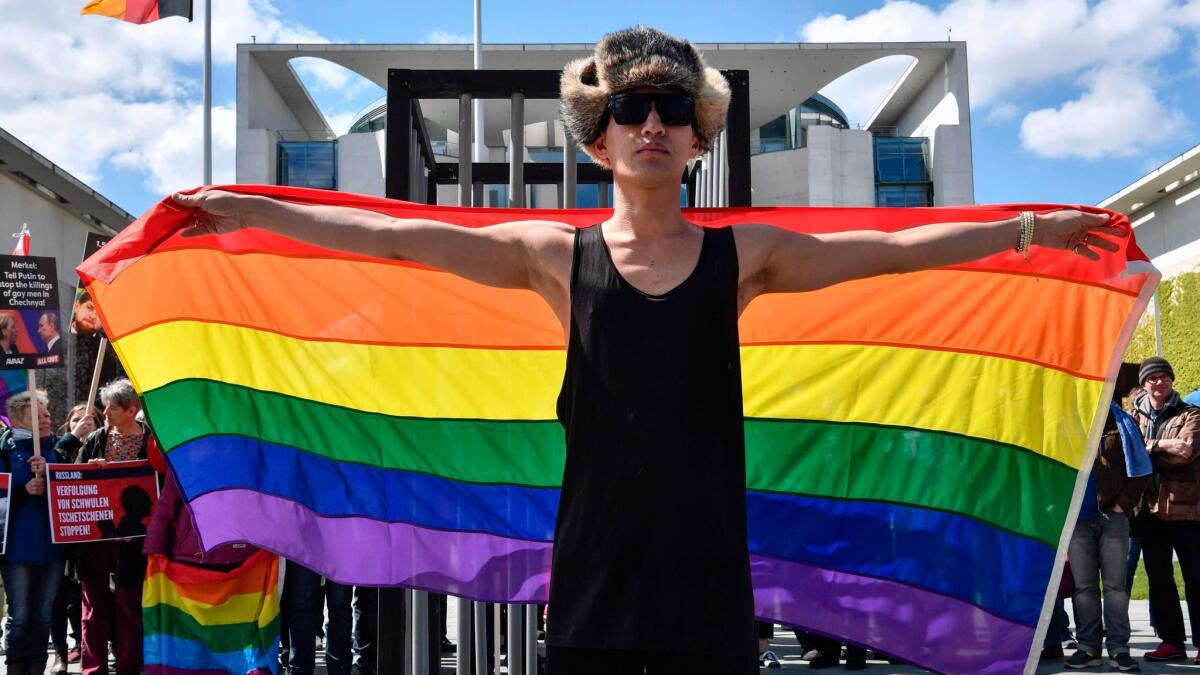How dinner with a lesbian couple changed Angela Merkel’s position on same-sex marriage

Germany has voted to legalize same-sex marriages, despite failing to win the vote of Angela Merkel, the nation’s longtime chancellor. (June 27, 2017) (Sign up for our free video newsletter here http://bit.ly/2n6VKPR)
- Share via
Reporting from BERLIN — Chancellor Angela Merkel surprised Germans and her own conservative party just three months before the Sept. 24 election by abruptly signaling her support for same-sex marriage — a major shift for the normally cautious leader.
Even though Germany, generally considered progressive on social issues, was one of the first European countries to legalize same-sex partnerships, in 2001, Merkel’s conservative-led government since 2005 repeatedly refused to consider granting full legal rights for same-sex unions because of staunch opposition from her party’s right wing.
Already leery of Merkel because she eliminated military conscription, which the right cherished, and decided to close down the country’s nuclear power plants, the conservatives in her ruling Christian Democratic Union watched helplessly Monday evening as Merkel discarded yet another sacred chapter of their playbook by telling a group of readers from a women’s magazine that she was now in favor of an open vote in Parliament on same-sex marriage.
“I would like to steer the discussion more into the direction of a question-of-conscience vote rather than me forcing through [Parliament] a majority decision,” Merkel said. By that, she meant she would rather allow members of her party to vote according to their conscience on same-sex marriage than be forced to vote as a bloc.

Because most other major parties in Germany are demanding legislation allowing same-sex marriage, the measure would almost certainly be passed quickly by the new Parliament’s lower house, the Bundestag, shortly after the election.
Merkel stopped short of explicitly speaking in favor of same-sex marriage, relying on her typically understated and opaque style of speech. But her remarks were widely seen in Germany as a reversal of her opposition, and they dominated headlines and the airwaves Tuesday.
Stern magazine called it a “bombshell” that shattered “one of the pillars” of conservatism in Germany.
Despite her popularity across Germany and the perception that she is at the peak of her powers, Merkel’s hand may have been forced because several would-be coalition partners are demanding support for same-sex marriage as a condition for joining an alliance with her party after the September election.
Merkel is widely expected to win a fourth, four-year term to lead Europe’s largest economic power. Some members of Parliament are calling for a quick vote on the marriage issue this week, the final week the Bundestag meets before the election, but that is considered unlikely.
It remains to be seen how the conservative wing of her party will react to the surprising turn of events. Leaders in the archconservative Christian Social Union, the Christian Democrats’ Bavarian sister party, already expressed their opposition. “I don’t want to see this issue ever discussed in Parliament,” said Peter Ramsauer, a leader of the Bavarian party.
Merkel, who had spoken out firmly against same-sex marriage in the election campaign four years ago because she feared negative consequences for adopted children, shifted gears by mentioning at the event in Berlin, organized by Brigitte magazine, that she recently had an epiphany on the issue.
“I had a life-changing experience in my home constituency,” Merkel explained during a question-and-answer session with the audience. She said she had been invited to dinner with a woman and her partner who were caring for eight foster children. She saw that the children were well cared for, and it dawned on her that her party’s arguments against same-sex marriage were no longer valid.
“If the youth welfare service entrusts a lesbian couple with eight foster children, then the state could no longer use child welfare as an argument against adoptions,” she said.
The opposition from Merkel’s government has been oddly out of tune with much of Europe and the rest of the country, which, according to polls, has long favored same-sex marriage. Yet Merkel’s popularity has remained high over the last 12 years and she is well ahead of her nearest rival in polls.
“Merkel switched her position now to prevent the [political opposition] from attacking her on it in the campaign,” said Thomas Jaeger, a political scientist at Cologne University. “About 80% of the people in Germany are in favor and she’s willing to take on a few hard-line conservatives in her own ranks.”
Despite its progressive traditions and early acceptance of same-sex partnerships nearly two decades ago, Germany had been overtaken in allowing same-sex marriage by many other Western European countries, including the Netherlands, those in Scandinavia, the United Kingdom and even Roman Catholic-dominated ones such as France, Spain and Ireland.
Germany has had a number of popular gay leaders in the last decade, including former Berlin Mayor Klaus Wowereit from the center-left Social Democrats and former Hamburg Mayor Ole von Beust from Merkel’s conservatives. The late Guido Westerwelle, Germany’s foreign minister in Merkel’s government from 2009 to 2013, lived in a “registered partnership” with his partner, and Merkel spoke at his funeral.
Kirschbaum is a special correspondent.
ALSO
Support for same-sex marriage has grown steadily since Supreme Court ruling
Prime Minister Theresa May unveils details of her ‘Brexit’ plan for EU nationals in Britain
More to Read
Sign up for Essential California
The most important California stories and recommendations in your inbox every morning.
You may occasionally receive promotional content from the Los Angeles Times.










